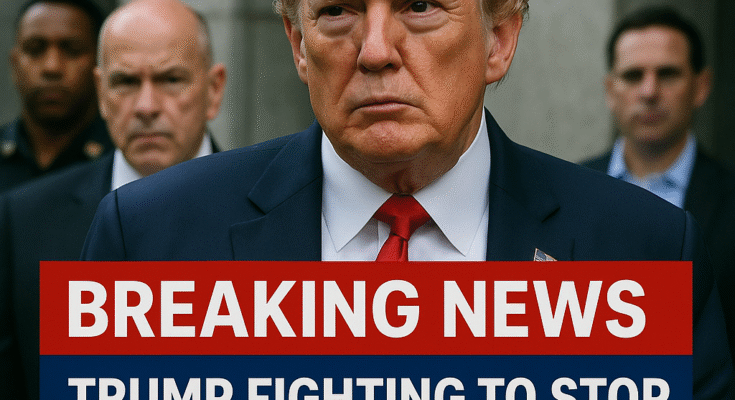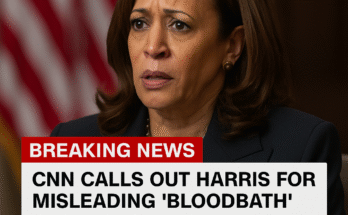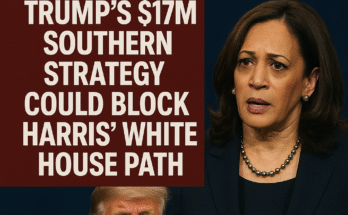President Donald Trump is making a second attempt to move his New York criminal case to federal court. He argues that the state proceedings are causing “direct and irreparable harm,” especially as his September 18th sentencing date approaches. Trump’s legal team filed a notice in the United States District Court for the Southern District of New York, asserting that the case should have been dismissed long ago.
Key Arguments for Removal
Trump’s lawyers are putting forth several arguments to justify moving the case out of Judge Juan Merchan’s state court:
- Presidential Immunity: The core argument is that the Manhattan District Attorney’s office violated Trump’s presidential immunity during grand jury proceedings and throughout the trial. They point to a recent Supreme Court ruling affirming immunity for official acts and argue that prosecutors improperly used evidence related to his official duties.
- Preemption by Federal Law: Trump’s team contends that Manhattan DA Alvin Bragg overstepped his authority by prosecuting federal election law matters at the state level. They argue that the case is preempted by federal law, particularly the Federal Election Campaign Act (FECA), and that the indictment improperly sought to “retroactively police” the 2016 election. They highlight that neither federal prosecutors nor the FEC initially pursued these charges.
- Supremacy Clause Violations: The filing asserts that Bragg is ignoring the Supremacy Clause of the Constitution through this “purely political” prosecution.
- First Amendment Violations: The ongoing post-trial gag order imposed by Justice Merchan is highlighted as a violation of Trump’s First Amendment rights, preventing him from engaging in political advocacy and responding to criticisms, especially as he is the leading candidate in the 2024 election.
- Irreparable Harm and Unjust Sentencing: The notice emphasizes that an unjust sentencing, potentially leading to “immediate and unconstitutional incarceration,” would prevent Trump from continuing his campaign.
- Misrepresentations by the Prosecution: Trump’s team alleges that DA Bragg made misrepresentations to the federal court during the first removal attempt. They claim Bragg assured the court that the case would not involve Trump’s official duties as president, but then proceeded to introduce evidence related to his official acts during the trial. Examples cited include testimony from former White House Communications Director Hope Hicks about conversations in the Oval Office and evidence of Trump’s official statements and financial disclosures.
- Flawed Jury Instructions: The filing criticizes the jury instructions, stating they were “watered down” and required jurors to act like FEC commissioners without the benefit of expert testimony on complex federal election laws. They also point out the lack of a requirement for unanimous jury findings on the underlying elements of the alleged offenses.
- Judge Merchan’s Alleged Bias and Conflicts of Interest:
- The motion renews requests for Judge Merchan’s recusal, citing his daughter’s work for political opponents of Trump, including Kamala Harris and Joe Biden, through her company Authentic Campaigns. It’s alleged this company has solicited contributions based on developments in Trump’s legal proceedings.
- The filing also mentions Judge Merchan’s past political contributions to Democratic interests, which they claim violated New York ethical rules.
- It’s asserted that Judge Merchan has shown bias against Trump, referencing alleged comments about Trump’s Twitter use, and has unfairly maintained the gag order.
What Happens Next?
Trump’s legal team is requesting that the federal court:
- Accept this second removal notice.
- Confirm that Judge Merchan cannot sentence Trump while this federal litigation is pending.
- Order the case removed to federal court.
- Notify Judge Merchan of the removal.
- Set a schedule for motions so Trump can seek dismissal of the case and vacate the jury’s verdict.
The filing argues that recent Supreme Court decisions on presidential immunity and agency deference (overruling Chevron) provide new grounds for removal. They emphasize that New York procedures have proven inadequate to protect federal interests and that allowing the state proceedings to continue will cause ongoing harm to Trump, the presidency, and the American people.
The outcome of this legal maneuver remains to be seen, but it introduces another significant challenge to the New York case just weeks before the scheduled sentencing. The potential for federal intervention could delay or even halt the state court’s sentencing process.



